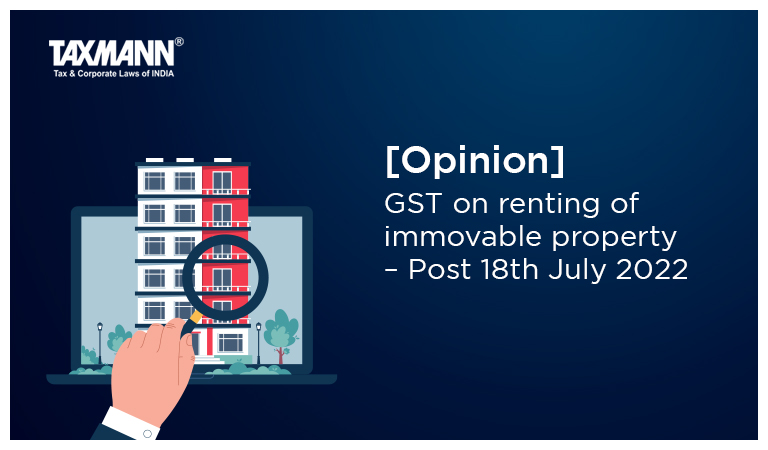[Opinion] GST on renting of immovable property – Post 18th July 2022
- Blog|News|GST & Customs|
- 3 Min Read
- By Taxmann
- |
- Last Updated on 3 August, 2022

R. K. Suchindra – [2022] 141 taxmann.com 1 (Article)
Background
1. Renting of immovable property was first brought under the service tax net 15 years ago, under the positive list regime in the year 2007. While it was shrouded with some ambiguity, the same was made abundantly clear through retrospective amendments made in law subsequently. Thereafter, with the advent of negative list regime under the service tax laws from July 2012, a specific entry in the declared service list was incorporated to expressly state that such services are within the ambit of service tax laws, lest a contention may have been raised by taxpayers that mere renting is not a “service”.
2. Under the GST regime, the provisions continued Para Materia, by way of inclusion of the words “license, rental, lease” within the definition of “supply” itself.
3. Throughout the above period, the intention of government seemed to be tacitly clear – to levy tax on commercial rentals and short-term accommodation (subject to threshold limits) while at the same to exempt residential rentals.
4. The two-fold tests to determine eligibility of exemption in case of residential rentals under GST regime were – firstly, the nature of property test, i.e. property should be a “residential dwelling”; and secondly, the end-use test, i.e. property should be used as residence. Other factors such as registration status of the lessor or lessee were not material.
5. In case of accommodation services by commercial spaces (hotels, inns, guest houses, etc.) not covered under the exemption above, separate exemption entry was available where the declared tariff was below Rs. 1,000 per day. If such spaces are rented through eCommerce operators, such operator is required to pay tax under section 9(5) of the CGST/SGST Act in cases where the supplier is unregistered. Where the supplier is registered, tax shall be paid on forward charge basis, but may attract TCS provisions under section 52 of the CGST/SGST Act.
Emerging business models
6. Whilst the above tax positions were simple enough on paper, practically various business structures emerged which necessitated specific addressal by the Government. Take for instance a structure where residential properties are rented and used as residence but managed by third parties as part of their commercial operations. For example, a residential property with many units is taken on rent by a commercial operator and run as managed paying-guest accommodations or hostels. Further vagaries in these structures may exist whereby the property may be rented by the commercial operator who in-turn sublets to the tenants (sublet model) or the property is directly rented by landowner to the tenants with the commercial operators taking their share by way of service fees charged to the tenant and / or landowner (agency model) or existence of multiple such operators or managing the properties for institutional customers such as educational institutions (as hostels for students), factories (as PG for workers), etc. . Added to this, the commercial operator may be running the rentals through e-Commerce which would overlap the eCommerce-operator specific GST provisions.
7. In the above backdrop, various rulings of Authority for Advance Rulings were being pronounced across the country wherein some of these structures were evaluated. One such ruling eventually culminated into a Karnataka High Court judgement in the case of Taghar Vasudeva Ambrish v. Appellate Authority for Advance Ruling [2022] 135 taxmann.com 287 / [2022] 91 GST 750 (Kar.), wherein the Honourable High Court held that the exemption notification does not require the lessee itself to use the premises as residence, and hence, as long as the dual conditions of residential dwelling and end-use for residential purposes are fulfilled, the service remains exempt.
Click Here To Read The Full Article
Disclaimer: The content/information published on the website is only for general information of the user and shall not be construed as legal advice. While the Taxmann has exercised reasonable efforts to ensure the veracity of information/content published, Taxmann shall be under no liability in any manner whatsoever for incorrect information, if any.

Taxmann Publications has a dedicated in-house Research & Editorial Team. This team consists of a team of Chartered Accountants, Company Secretaries, and Lawyers. This team works under the guidance and supervision of editor-in-chief Mr Rakesh Bhargava.
The Research and Editorial Team is responsible for developing reliable and accurate content for the readers. The team follows the six-sigma approach to achieve the benchmark of zero error in its publications and research platforms. The team ensures that the following publication guidelines are thoroughly followed while developing the content:
- The statutory material is obtained only from the authorized and reliable sources
- All the latest developments in the judicial and legislative fields are covered
- Prepare the analytical write-ups on current, controversial, and important issues to help the readers to understand the concept and its implications
- Every content published by Taxmann is complete, accurate and lucid
- All evidence-based statements are supported with proper reference to Section, Circular No., Notification No. or citations
- The golden rules of grammar, style and consistency are thoroughly followed
- Font and size that’s easy to read and remain consistent across all imprint and digital publications are applied



 CA | CS | CMA
CA | CS | CMA
